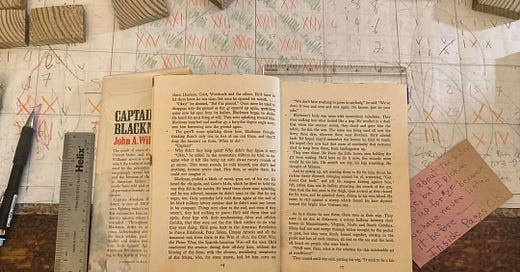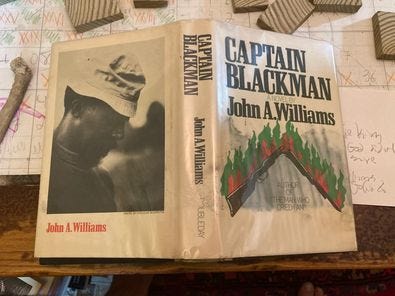The guys'll come splashing down here, Blackman thought, thinking there is only one or two of em out there, and they'll drop the hammer on them. What to do?
“Captain?"
Captain Blackman, career officer, reasons that the enemy riflemen are drawing his drafted men, hastily trained late in the war, into their sights.
Why didn't they keep quiet? Why didn't they figure it out?
He has been teaching them the liberal arts, where they learn to think as an individual facing other minds, but it hasn't taken yet.
He heard the 16s again, and Griot's M-60, which he liked to hold the way they did in the movies.
The 16s are our standard rifle in that war, now popular as deer rifles as the M-1 of our invasion of Europe and the war for the Pacific became after 1945. The M-60 is a squad automatic weapon you have seen in movies, in use to this day. The nom de guerre of its operator here, Griot, means an historian of Africans.
He heard them closer now, splashing, and he was relieved, because he didn't want to die. But he was angry, too. Only yesterday he'd told them again at the end of his black military history seminar that he didn't want any heroes in his company.
A hero is a dead guy. Doesn't matter why you die on deployment. One of the Greeks fell off a roof. Still your friends feast and hold games. Not an instrumental, modern, rational idea. We here now want the other son of a bitch to die for his country.
Things were close to the end, and even if they weren't, they had nothing to prove.
How do you ask a man to be the last man to die for his country? So a naval hero, somehow still alive, asked Congress about that time. But Captain Blackman is saying all that and one thing more.
He'd told them time and again, these legs with their mushrooming Afros and off-duty dashikis, that they were not the first black soldiers to do what they were doing, He'd gone back to the American Revolution to Prince Estabrook, Peter Salem, Crispus Attucks and all the unnamed rest; from there to the War of 1812, the Civil War, the Plains Wars, the Spanish-American War - all the wars.
The propagandists on the other side had got black American soldiers exactly wrong. They had reached out as fellow colonials. A friend of mine did that successfully to the African troops fighting for France.
What the VC didn't grasp, what world revolution got wrong, what Captain Blackman had to teach his men, was that black Americans are nothing but Americans. Jim Hendrix was Airborne.
He'd conducted the seminar during their off-duty time, without the blessing of the brass, with the obvious, smoldering resentment of the Major, who, for some reason, had let him carry on.
“We don't have anything to prove to anybody,” he said. “We've done it over and over and over again, No heroes. Just do your jobs."
But there his men were, heroic under fire. If anyone is going to be a hero it had better be a god-damned officer, the man who had failed to teach the men to think.
They were closer. He knew the little brown men holding the 47s were waiting. He'd have to do it now; five seconds more would be too late.
So begins the thrilling tale of Captain Blackman, hit like Hank Morgan, the Connecticut Yankee, back into the original sin of the modern world.
He stands up shouting his men back away from the trap and goes down firing.
He came to rest against a stump which forced his face skyward toward the bright blue Vietnam sky.
As in a dream he saw them, these men in their wigs. They were in an inn in Delaware, a colony halfway between their homes in Massachusetts, Virginia, North and South Carolina.
And so Captain Blackman begins his passage through the United States of America while at rest in the Republic of Viet Nam.
I plan to return with the next episode when John A. Williams' novel comes up again in this lectionary from the apocrypha, canon, and deuterocanon, with midrash and patristics, occasioned by the nation of Viet Nam, but you might want your own copy.
This was the first Viet Nam letter of 5 so far presenting Captain Blackman by John A. Williams. The second posted on May 4, 2022, the third on June 6, 2022, the fourth on July 23, 2022, and the fifth on February 16, 2023.
Viet Nam letters respects the property of others under paragraph 107 of United States Code Title 17. If we asked for permission it wouldn’t be criticism. We explain our fair use at length in the letter of September 12, 2022.
The colophon of these Viet Nam letters, directly above, shows the janitor speaking with poet David A. Willson on a Veterans Day.






